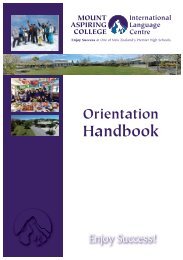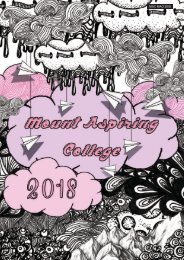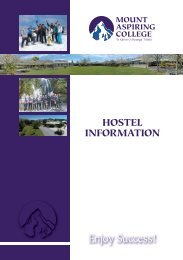MAC ILC Homestay Handbook (Residential Caregiver Booklet)
Handy info for Homestay parents who look after our international students here at the International Language Centre, Mount Aspiring College.
Handy info for Homestay parents who look after our international students here at the International Language Centre, Mount Aspiring College.
Create successful ePaper yourself
Turn your PDF publications into a flip-book with our unique Google optimized e-Paper software.
Enjoy Success!<br />
<strong>MAC</strong> <strong>ILC</strong> <strong>Homestay</strong> <strong>Handbook</strong><br />
INTRODUCTION<br />
Like most other secondary schools, Mount Aspiring College (<strong>MAC</strong>) and the <strong>ILC</strong> have a number<br />
of International fee-paying students. Students come from a variety of countries, including Japan,<br />
Thailand, Korea, Hong Kong, France, Germany, Italy, Paraguay and Colombia.<br />
International students add to the cultural diversity of <strong>MAC</strong> and help to promote cultural awareness<br />
and understanding. They also make a major financial contribution to the school, which is of<br />
benefit to all students.<br />
Thank you for welcoming an international student into your home. We are sure you will find the<br />
experience interesting, and challenging. We hope that this booklet will be useful and will help to<br />
make your homestay experience positive and rewarding.<br />
We appreciate the commitment you are making in providing a homestay and aim to help you<br />
in any way possible. If you have other questions, or if problems arise, please don’t hesitate to<br />
contact us at any time (please refer to contact details overleaf).<br />
Claire Easterbrook - International Manager<br />
IMPORTANT CONTACT NUMBERS<br />
In an emergency please contact Claire Easterbrook. Her number is 027 253 1926.<br />
The <strong>ILC</strong> Office is 03 443 0466 and the Main College Office is 03 443 0499<br />
You may also have to go to the main office during your stay. All money accounts are paid to the<br />
main office. The people who will help you there are Mandy Sherson, Samantha Drayton, Kathy<br />
Tweedie and Thelma McMurray<br />
When calling these numbers from outside Wanaka you will need to use the (03) Code. The<br />
international code for New Zealand is 64 eg if you are calling from overseas the <strong>ILC</strong> telephone<br />
number is 0064 3 443 0466<br />
www.mountaspiringcollege.nz | ilc@mtaspiring.school.nz | 03 443 0466 | page 3 of 37
<strong>MAC</strong> <strong>ILC</strong> <strong>Homestay</strong> <strong>Handbook</strong><br />
Enjoy Success!<br />
WHY STUDY IN NEW ZEALAND?<br />
Why do students from overseas want to study here?<br />
Many students, mainly from Asian countries, come to New Zealand to gain qualifications that<br />
are not easily accessible - or not available at all - in their own country. Gaining qualifications<br />
in an English-speaking country will also greatly increase their future employment opportunities.<br />
Attending secondary school is seen as an important stepping-stone in this process. Many continue<br />
their studies at N.Z. tertiary institutions or move to another English-speaking country such as<br />
Australia or America to attend University. Students are expected to complete all assessments,<br />
tests and exams during the year.<br />
Our students from Europe and South America mainly come to improve their English, and to enjoy<br />
the outdoor education opportunities.<br />
New Zealand is a popular destination for study abroad. We have a reputation for being ‘clean and<br />
green’ with a relatively safe environment and a well -regarded standard of education.<br />
What does a <strong>Homestay</strong> Family (<strong>Residential</strong> <strong>Caregiver</strong>) provide?<br />
All International students at <strong>MAC</strong> must live with a parent, a designated caregiver or in a schoolapproved<br />
homestay. No student can go flatting. This is a condition of enrolment.<br />
Providing homestay care for a teenager is different from having an adult boarder. We hope you<br />
will treat your student as a member of the family rather than a guest.<br />
<strong>Homestay</strong>s provide the following:<br />
• Airport meeting, if required. It is expected that the homestay will be available to meet the<br />
student if at all possible, and will take the student home from this point<br />
• A bedroom with a desk for study (students are not expected to share a room)<br />
• Three meals a day<br />
• A warm and comfortable environment (students do not pay extra for electricity)<br />
• The kindness, care and support you would hope your own children would be given.<br />
page 4 of 37 | www.mountaspiringcollege.nz | ilc@mtaspiring.school.nz | 03 443 0466
Enjoy Success!<br />
<strong>MAC</strong> <strong>ILC</strong> <strong>Homestay</strong> <strong>Handbook</strong><br />
Absences<br />
Any absence must be explained to Sam at the school office as soon as possible in the morning<br />
(phone 443 0466 x 810). If your student is going to be absent for more than one day or you are<br />
concerned about their health, contact the <strong>Homestay</strong> Coordinator.<br />
Civil Emergency<br />
In the case of Wanaka, this is likely to be an earthquake. The <strong>Homestay</strong> parent/s will continue<br />
to maintain responsibility for the student’s safety and welfare. Please discuss your Household<br />
Emergency Plan in the case of emergencies - and the Drop, Cover, Hold rule….don’t run outside!!!<br />
Students’ Guardians<br />
Students have the school as their guardian. Many homestays are happy to deal with day-to-day<br />
problems without contacting the school. However, if a more serious problem arises, it is important<br />
that the school is notified, even if the homestay or guardian has dealt with it independently.<br />
Overnight Stays<br />
If your student wants to stay overnight at a friend’s place, please ensure you have all the contact<br />
details for that family and inform the <strong>Homestay</strong> coordinator of the plan. In some cases the student’s<br />
agent will require these details. Host parents are expected to know where their student is 24/7.<br />
<strong>Homestay</strong> Parent Absences<br />
If the homestay parent/family needs to be away overnight or for an extended period of time and<br />
is unable to take the student with them, you must inform the homestay coordinator, who can<br />
organise temporary accommodation for the student.<br />
Students out<br />
on their bikes<br />
www.mountaspiringcollege.nz | ilc@mtaspiring.school.nz | 03 443 0466 | page 5 of 37
<strong>MAC</strong> <strong>ILC</strong> <strong>Homestay</strong> <strong>Handbook</strong><br />
Enjoy Success!<br />
The first few weeks - setting guidelines<br />
The following points may be helpful, whether you are new to homestaying or an old hand.<br />
• Check pronunciation of names. What will your student call you?<br />
• Show your student around the neighbourhood: supermarket, bank, library, etc.<br />
• Explain your family routines - what times family members tend to get up and go to bed, meal<br />
times, using the bathroom, washing clothes, making snacks etc. Even if your student has lived<br />
in another Kiwi homestay, every family has different routines. This is important to help the<br />
student feel settled.<br />
• Make sure your house rules are clear, (some homestays have them in writing). Different<br />
homestays have different guidelines but we recommend the following:<br />
1. Tell us if you are going to be late home so we don’t worry.<br />
2. Let us know if you won’t be home for a meal.<br />
3. Friends are welcome but if they want to have a meal or stay the night, you should always ask<br />
first.<br />
4. If you want to stay with a friend overnight or go away on a holiday, you must leave contact<br />
details. For holidays you need to complete a Student Travel Form. This is for your safety and<br />
so you can be reached in an emergency.<br />
5. Keep your room tidy.<br />
page 6 of 37 | www.mountaspiringcollege.nz | ilc@mtaspiring.school.nz | 03 443 0466
Enjoy Success!<br />
<strong>MAC</strong> <strong>ILC</strong> <strong>Homestay</strong> <strong>Handbook</strong><br />
It is a good idea to discuss other things like using the telephone and computer, issues about<br />
smoking and alcohol ( definitely forbidden), reasonable length of time in the shower, use of<br />
heaters/electric blankets, playing music late at night, bedtimes, times you expect your student<br />
home at night, and the latest friends can visit. Many of these things don’t need to be written down<br />
but can be discussed as issues arise. Helping with the dishes etc will help the student feel part<br />
of the family (students may not offer to help as they never do so at home, but will be happy to do<br />
so if you ask).<br />
It is important to remember that it is your home and you have the right to expect certain standards<br />
of behaviour. Many students are wonderful, but some are used to a lot of freedom at home. In<br />
some countries, servants are common. If your student is treating your house like a hotel, it is up<br />
to you to explain the difference! Some students come from strict home backgrounds where every<br />
moment of the day is accounted for. The extra freedom and lack of parental supervision in N.Z.<br />
can cause problems.<br />
By offering to be a homestay, you have accepted a degree of responsibility for the teenager in<br />
your care. Parents expect that you will act in the best interest of their child and this includes<br />
setting firm guidelines. The safety of the student in your care is paramount. For most, the main<br />
purpose for being in N.Z is to study. Do not hesitate to set rules, especially for younger students.<br />
What would you expect of your own child?<br />
With some students, enforcing rules is not easy. They may not want to accept your authority<br />
because you are not the parent. If your student repeatedly refuses to follow reasonable rules<br />
and you are worried and unhappy, it is most important that you contact the school/the homestay<br />
coordinator. If the problem cannot be resolved, you have the right to ask the student to leave.<br />
Lara relaxing<br />
with her<br />
<strong>Homestay</strong><br />
family<br />
www.mountaspiringcollege.nz | ilc@mtaspiring.school.nz | 03 443 0466 | page 7 of 37
<strong>MAC</strong> <strong>ILC</strong> <strong>Homestay</strong> <strong>Handbook</strong><br />
Enjoy Success!<br />
Changing <strong>Homestay</strong>s<br />
The <strong>ILC</strong> places a student in a homestay for an intended length of time in good faith. There is,<br />
however, no guarantee that the student will remain in the same homestay for the full time. Moving a<br />
student is not done lightly. If a problem occurs, the school will work with the homestay and student<br />
to overcome the problem. Students are constantly encouraged to work through any problems by<br />
talking to their homestay and school staff.<br />
It is not uncommon for some students who have just arrived in New Zealand to ask to move almost<br />
immediately, and this is often the result of culture shock. Some students cannot face discussing<br />
quite minor problems because they think it will be interpreted as rudeness by the homestay. They<br />
would rather avoid the issue by changing homestay immediately. In these cases, a trial period<br />
almost always results in the resolution of initial problems. In many cases, it takes at least one<br />
month for students to feel settled in a new homestay, therefore students will not be moved in the<br />
first month unless the situation is urgent.<br />
If, after this process, a problem cannot be resolved and the student and/or homestay remain<br />
unhappy, a new homestay will be found.<br />
The International Language Centre reserves the right to move a student from a homestay at any<br />
time if it is felt the student’s health and safety is at risk.<br />
Possible reasons for leaving a homestay<br />
• Student returns to home country at parents’ request<br />
• <strong>Homestay</strong> unable to continue care. (eg., illness, transfer)<br />
• Student behaviour is unacceptable to homestay parents and/or the school (eg., continued<br />
disobedience, theft, serious breach of school rules)<br />
• Behaviour from homestay members that is unacceptable to the student/parents/school (eg.,<br />
physical punishment, lack of respect for student’s cultural beliefs, theft)<br />
• A ‘mismatch’ between the student and homestay<br />
• Written request from parents for their child to now live with a designated caregiver or family<br />
member.<br />
The Problems of Culture Shock And Homesickness<br />
Moving to another country requires a time of adjustment: the language, food, people, weather,<br />
houses and ways of doing things are suddenly different. These changes affect people in a variety<br />
of ways: some students adjust quickly to their new environment; others go through bouts of<br />
homesickness and uncertainty before they settle down. Culture Shock is a very real thing, but it<br />
does pass with time.<br />
page 8 of 37 | www.mountaspiringcollege.nz | ilc@mtaspiring.school.nz | 03 443 0466
Enjoy Success!<br />
<strong>MAC</strong> <strong>ILC</strong> <strong>Homestay</strong> <strong>Handbook</strong><br />
Many students go through the following stages:<br />
Leaving Home<br />
Nervous, sad to leave family and friends but excited and adventurous. Expectations of their new<br />
life may be unrealistically high.<br />
The First Few Weeks<br />
Excited and stimulated. The student may be on a “high”, enjoying new experiences and meeting<br />
new people. Tiredness may be a problem.<br />
After 4 or 5 Weeks<br />
As initial excitement wears off, homesickness may strike. There may be rosy memories of home<br />
and feelings of anxiety, loneliness and confusion may set in. Physical symptoms may include<br />
tiredness, head and stomach aches, changed sleeping and eating patterns. School work may<br />
seem too difficult and a fear of “letting down the family if I fail” may occur. The student may wonder<br />
if they made the right decision to come to New Zealand.<br />
Eventually...<br />
These feelings will pass. Friends will be made, and school life will settle down. The student may<br />
become more realistic about expectations and realise that emotional ups and downs are normal.<br />
Feelings of confidence and happiness will return.<br />
Also…Students can also experience “reverse Culture Shock” when they return home. After<br />
adjusting to the New Zealand way of life and being more independent, some find returning to their<br />
old life style quite difficult.<br />
Contact with parents<br />
Some homestays have a lot of contact with parents. Some have none. This often depends on<br />
whether the parents speak English. Mount Aspiring College will normally send all school reports<br />
directly to the education agent, who will pass on the information to the parents. The school also<br />
contacts agents (or parents if an agent hasn’t been used) if other issues or problems arise. It can<br />
be very rewarding for homestays to develop contact with parents if it is possible.<br />
<strong>ILC</strong> students hit<br />
the snow<br />
www.mountaspiringcollege.nz | ilc@mtaspiring.school.nz | 03 443 0466 | page 9 of 37
<strong>MAC</strong> <strong>ILC</strong> <strong>Homestay</strong> <strong>Handbook</strong><br />
Enjoy Success!<br />
KIWI CULTURE<br />
Cultural differences - Some common problems and possible explanations:<br />
“Our student arrived yesterday. We were told their English was quite good but they can’t<br />
say anything!”<br />
They may be in culture shock and overwhelmed. When they relax a little, the English they know<br />
will emerge.<br />
“My student won’t look me in the eye. They must be so shy.”<br />
Not necessarily. They may be showing respect. In some cultures, making eye contact with an<br />
elder, especially when being told off, is impolite.<br />
“My student arrived three days ago but hasn’t used the shower!”<br />
Have you shown them how your shower works? Western showers are very different to some<br />
bathing facilities in countries such as Japan. They may be too shy to ask.<br />
“My student is relaxed with me but seems tense when my husband is around. I don’t think<br />
they like him.”<br />
In some Asian countries it is uncommon for the father to spend a lot of time at home, be home for<br />
meals etc. Perhaps they need time to adjust to a man being present.<br />
“Our student will do anything my husband asks but he is rather arrogant towards my<br />
daughter and me. I think he is rude.”<br />
In some cultures males hold a higher status. Mothers wait on males at the table and father holds<br />
the authority He may not realise this appears rude and is acting in an acceptable way in his own<br />
culture. Try to explain that in N.Z everyone is equal.<br />
“My student never bothers to help around the house. How lazy.”<br />
Have you explained that you would like them to do this? Live-in home help is not uncommon in<br />
many countries and perhaps they have never had to do chores at home. Explain that in New<br />
Zealand everyone helps out.<br />
“My student always agrees to do things even when I’m sure they would rather not. They<br />
often say ‘maybe’ instead of a definite ‘yes’ or ‘no.’”<br />
Many students will have difficulty saying no because they don’t want to appear rude or ungrateful.<br />
Reassure them it’s OK to decline an offer.<br />
“My student has been here for six weeks and is suddenly really homesick.”<br />
This can be a danger time, after the initial excitement has worn off. Winter, mid year, can also<br />
be a down time. Encourage them to talk, explain it is normal to feel homesick. Be understanding<br />
and keep them busy. They’ll want to spend time alone but this can increase the loneliness. Their<br />
friends will also be able to give support. Let the school know if you have concerns.<br />
page 10 of 37 | www.mountaspiringcollege.nz | ilc@mtaspiring.school.nz | 03 443 0466
Enjoy Success!<br />
<strong>MAC</strong> <strong>ILC</strong> <strong>Homestay</strong> <strong>Handbook</strong><br />
“My student told their teacher that they are cold at night but they didn’t tell me. The teacher<br />
rang me and now I feel embarrassed.”<br />
Don’t be. Some students will keep small problems to themselves, as they don’t want to ‘be a<br />
nuisance’ or cause possible upset in their homestay. They may tell another person instead. Keep<br />
encouraging them to be open about any problems and reassure them you won’t be offended.<br />
“My student uses the heater all day and night, and always spends too long in the shower.”<br />
Students are made aware at orientation that they should only have their heaters on while they are<br />
in their rooms, and that they must limit the time they spend in the shower. However, if there are any<br />
concerns, speak with the student and explain what you feel is acceptable use of the heater and<br />
shower.<br />
“I wish our student would spend more time with the family in the evenings and less time<br />
in their room.”<br />
This is a common problem, especially at the beginning. Most students will need some time alone<br />
- it is exhausting getting used to a new culture and a huge effort trying to speak English all the<br />
time, especially after a day at school. There should be a balance though. This can be a problem<br />
if they are homesick.<br />
If, after they are settled, the student is spending all their time in their room devices, you may need<br />
to speak with the school. If they are neglecting schoolwork and/or coming to school sleepy, their<br />
device may need to be taken away until time limits are agreed upon.<br />
“Our student often goes to bed very late but then can’t get up in the morning.”<br />
Many students from overseas study or use the internet too late. Going to bed at 10pm seems<br />
very strange to many. Computer use may also be a problem (see above). Explain how you need<br />
to get up early for work etc and the house needs to be quiet so others can sleep. If they can’t get<br />
up they obviously need to do the same.<br />
“My student has been here for several months. They made good progress at the start but<br />
now don’t seem to be improving.”<br />
Language learning is a complicated business and doesn’t occur in a steady, even progression.<br />
Students often make a lot of progress initially as they learn a lot of vocab and then seem to<br />
plateau. Another jump in progress will occur.<br />
“At times my student appears rude as they speak too ‘informally’ with older adults they<br />
have just met. They are also starting to use some swear words.”<br />
Understanding levels of formality in English is really difficult if it is not your first language. Many<br />
students will copy the language of those around them. They may use slang/swear words without<br />
having any idea they are inappropriate. This can result in some quite funny situations! It is<br />
important the student is told. If you think it is intentional, don’t accept it.<br />
www.mountaspiringcollege.nz | ilc@mtaspiring.school.nz | 03 443 0466 | page 11 of 37
<strong>MAC</strong> <strong>ILC</strong> <strong>Homestay</strong> <strong>Handbook</strong><br />
Enjoy Success!<br />
“Our student is not doing much study at home. They often say they don’t have homework.<br />
They are spending more time with friends in town on weeknights.”<br />
It is impossible to have no homework. Even if no assignments are due, there is always revision of<br />
work, reading an English book, making lists of new vocab and working on self-study for grammar.<br />
If your student wants to succeed they must have a balance between study and social life. You<br />
need to talk about this together and set some rules, for example they must be home by 6.00<br />
on weeknights. Contact the school and express your concerns. Extra work can be set and the<br />
message will be reinforced. The school will also contact agents/parents if needed.<br />
“Our student has trouble telling the truth.”<br />
This is frustrating and damaging to relationships. Confront the student and explain the importance<br />
of honesty. Contact the school to make us aware of the problem - we can reinforce this (some<br />
students will avoid open conflict at all costs and this includes telling you what they know you want<br />
to hear instead of the truth). Parents may need to be informed.<br />
“We have just discovered that our student has been bunking school.”<br />
Good attendance is vital. This is made very clear to students. When a student is absent the school<br />
office must be contacted. If a student is sick for more than two days he will be required to provide<br />
a Medical Certificate. The school and homestay need to work together to solve any attendance<br />
problems. If the problem is ongoing, they will be put on an attendance check and parents will be<br />
informed. Students with poor attendance despite written warnings may lose their place at Mount<br />
Aspiring College.<br />
“My student seems bored in the weekends and can’t seem to organise their free time.”<br />
This can be a common problem. Some students have every minute of the day organised for them<br />
at home, with long hours at school, extra study classes, music lessons etc. For many, the school<br />
day here is quite short and the concept of free, unstructured time is new. Many need help to be<br />
made aware of activities available in Wanaka and help to join sports clubs etc. Information is also<br />
given at school and students are constantly encouraged to join extra curricular activities. Students<br />
from big cities often find Wanaka very quiet!<br />
“Our student’s parents are coming to NZ and they expect to stay with us.”<br />
This is your decision but you are under no obligation to host family or friends. It can put pressure<br />
on the homestay. We suggest having a meal together.<br />
<strong>ILC</strong> students<br />
doing what<br />
they do best<br />
- having fun!<br />
page 12 of 37 | www.mountaspiringcollege.nz | ilc@mtaspiring.school.nz | 03 443 0466
















